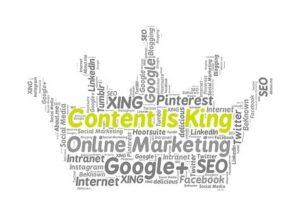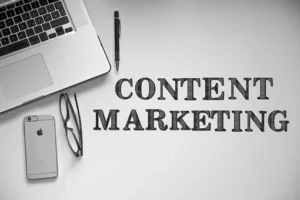What is Content Marketing, You’ve just heard the term “content marketing,” and you get the feeling you should know what it is, but you’re too ashamed to inquire. Congrats, this is your post.
The Content Marketing Institute, an online reference for all things content marketing, defines content marketing as follows:
Definition:
“It is a technique of creating and distributing valuable, relevant, and consistent content to attract and acquire a clearly defined audience – to drive profitable customer action.”
The crucial word in this sentence is “valuable.” It is what distinguishes this definition from others that might apply to nearly any type of advertising or marketing. You can determine if a piece of material is suitable for a campaign if consumers seek it out and want to consume it rather than avoid it, What is Content Marketing? Was VW’s 2014 “Game Day” commercial, which has almost 18 million views on YouTube as of the writing of this essay, an advertisement? The answer is both, depending on how each individual who is exposed to it reacts to it. The same is true for whatever piece of you develop, depending on whether the recipient gained something from it.
Content Marketing Examples:

There are as many different sorts of content marketing as there are different types of content—far too many to list here. My goal is to introduce you to and get you thinking like a content marketer so you can identify possibilities everywhere. You’ll soon be generating 50 ideas every day. You’ll find yourself always looking for new ways to produce What is Content Marketing? Here are five instances to get your mind working.
1. Webpages:
What is the distinction between a regular webpage and a content marketing webpage? Consider Moz’s The Beginner’s Guide to SEO, a supplier of SEO tools and information. This free resource has been seen millions of times, bringing in numerous consumers who would not have discovered Moz and the services they provide otherwise. Consider a case study from the design studio Teehan+Lax. The majority of case studies are tedious. These case studies are enthralling. That is the distinction between merely posting material to your website and content marketing.
2. Infographics:
They are often lengthy, vertical drawings including statistics, charts, graphs, and other data. If you’re looking for some inspiration, here are 197 infographics about content marketing selected by Michael Schmitz, head of the Content Lab at Publicis, Munich. Infographics may be effective since a good one can be shared on social media and put on websites for years. You may acquire a professionally produced infographic by hiring a contractor on a site like oDesk, or you can go with a firm like Visua.ly to remove some of the risks, Content Marketing.
A good infographic should cost at least $1,000 to produce, but it may cost several thousand dollars if you hire a contractor or firm to incorporate strategy and planning, research, authoring, and design. There’s also the issue of getting that infographic in front of bloggers and the media. You may also create a Pinterest board and compile infographics on a topic relating to your business. It is also a type of content marketing, and it just costs you your time. That worked for Michael, after all.
3. Videos:
Take a peek at Gary Vaynerchuk’s YouTube channel to see how he uses internet video for content marketing. He began by making films to advertise his family’s wine shop, and via those videos and other forms of online marketing, he eventually built it to a $45 million empire. Many believe that videos and podcasts are costly and difficult types of content marketing. Yet, with the decreasing cost of professional-grade equipment, producing high-quality video and audio material is simpler than ever. Amateur video has been used to sell blenders, introduce new dentistry goods, and promote Hong Kong immigration consultation services. What video might you create for your firm that could transform its fortunes overnight? It might be simpler.
4. Podcasts:
Michael Hyatt, author of the best-selling book Platform: Be Noticed in a Loud World, does what he teaches. His “This is Your Life” podcast is downloaded 250,000 times every month. “A podcast provides you awareness in a whole other world—primarily iTunes,” Hyatt explains in his blog piece 4 Reasons You Should Consider Starting Your Podcast, Content Marketing. I’ve had dozens of new individuals tell me they’d never heard of me until discovering me on iTunes.” With his podcast, Hyatt provides excellent knowledge and guidance for free. Yet, that podcast leads to increased book sales, course enrollments, and invitations for him to speak.
5. Books:
People frequently think of books as selling themselves, as they do movies, but effective marketers don’t sell books merely to sell books; they sell books as marketing tools. While I’m sure Michael Port likes selling his book, Book Yourself Solid is a mechanism for attracting clients to his coaching and speaking services. Although self-publishing has made it simpler than ever to publish a book, there is still a widespread belief that it is difficult and that only respected experts can do it. Write your own, and even if no one reads it, you can utilize it as every time you’re presented as the “Author of…”
These are just a few examples. I could have added white papers, ebooks, applications, public speaking, presentations, and blogs to the list,Content Marketing. There have been entire books published on how to use each of them in initiatives.
Why Content Marketing?
Understanding why is vital to your organization is maybe more important than understanding what is it. Initially, we must comprehend the four stages of the purchasing cycle:
1- Consideration:
At this point, the buyer begins evaluating different items from various sellers to ensure that they are obtaining a high-quality product at a reasonable price.
2- Research:
When a consumer learns that there is a solution, they will research to educate themselves. A vehicle buyer, for example, will strive to learn about the many types of cars available and which one will best suit their needs.
3- Awareness:
Before awareness, a consumer may have a need but is unaware of a solution.
4- Buy:
Ultimately, the consumer makes a decision and completes the purchase.
What is Content Marketing? Conventional advertising and marketing are excellent for the second and third phases. Content marketing addresses the first two phases of the purchasing process by increasing customer knowledge of solutions and educating them on a product they may not have considered previously.
During the last year, my firm has grown more than 1,000% thanks to content marketing. Prospective clients discover our material, find value in it, and are already sure they want to collaborate with us by the time they approach us. We don’t need to use high-pressure sales methods; it’s just a question of ironing out the specifics, signing an agreement, and getting started. The trust that is often required over a lengthy sales cycle has been established.
It also has the added benefit of supporting other digital platforms. It adds material for social media marketing and aids SEO efforts by producing natural inbound links and creating strong on your website that is found by search engines. In fact, for many businesses, the majority of their SEO efforts should be centered on content marketing.
What is Content Marketing?


